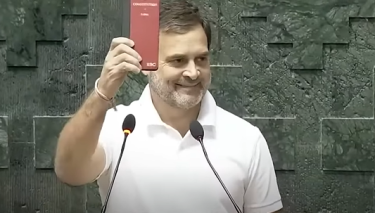
Rahul Gandhi of the Congress party has been appointed Leader of the Opposition in the Lok Sabha, the lower house of India's parliament. What makes this significant is the fact that this marks the first time in a decade that the post has been filled, signalling a shift in the country's political landscape.
Gandhi's appointment comes after the recent general election, where the Congress party secured 99 seats, surpassing the 10% threshold required to claim the position. This development introduces a new dynamic to Prime Minister Narendra Modi's government, which, despite retaining power with the help of allies, fell short of a majority after two consecutive landslides.
The role of Leader of the Opposition carries considerable weight in India's democratic system. As Gandhi steps into this position, he will sit on key committees responsible for crucial appointments and act as a counterbalance to the prime minister. His responsibilities include participating in the selection process for high-ranking officials such as the director of the Central Bureau of Investigation, Chief Election Commissioners, and the chairperson of the National Human Rights Commission.
In his inaugural address to the Lok Sabha in his new role, Gandhi set a tone of cooperation tinged with assertiveness. He congratulated Om Birla on his appointment as Speaker of the House and assured him of the opposition's support. However, he also emphasised the importance of allowing the opposition's voice to be heard, stating, "It is very important that co-operation happens on the basis of trust. It is very important that the voice of the opposition is allowed to be represented in this House."
Gandhi's elevation to this position has been met with varied reactions from the INDIA bloc partners, a coalition of opposition parties. While most allies have expressed support, some, like the Trinamool Congress, have stressed the importance of giving due consideration to regional parties.
The appointment is seen by many as a positive change for India's democracy. Opposition parties have repeatedly accused the governing Bharatiya Janata Party (BJP) of authoritarianism, a charge the BJP denies. A stronger opposition presence in parliament is expected to provide greater room for debate and make it more challenging for the government to pass bills without thorough discussions.
Gandhi's new role comes with significant responsibilities. As Leader of the Opposition, he is expected to effectively question government policies, present alternatives to government proposals, and ensure accountability to both the legislature and the public. The Leader of the Opposition is often described as a "shadow Prime Minister", prepared to take on the responsibility of forming a government should his party secure a majority in a future election.
The position also carries certain privileges and facilities. Gandhi will be entitled to a salary and allowances equivalent to those of cabinet ministers, a front-row seat in the Lok Sabha, and an office in the Parliament building with secretarial support.
In a rare display of bipartisanship, Prime Minister Modi and Gandhi were seen shaking hands in the Lok Sabha before escorting Om Birla to the Speaker's chair. This gesture, while small, may signal a potential for more cordial relations between the government and opposition.
Gandhi's appointment is particularly significant given his family's political legacy. He becomes the third member of the Gandhi family to hold this position, following in the footsteps of his father, former Prime Minister Rajiv Gandhi, and his mother, Sonia Gandhi.
Despite his long tenure in politics, including five terms as an MP, Gandhi has never held a ministerial position or led his party to victory in a general election. This new role will test his mettle as a leader and his ability to unite not only his own party but also the broader opposition coalition.
The impact of Gandhi's appointment extends beyond the walls of parliament. It is expected to invigorate the opposition's efforts in upcoming state elections and potentially reshape the political dynamics leading up to the next general election.
RJD spokesperson Mrityunjay Tiwari commented on the appointment's significance for Bihar, stating, "Now that Rahul Gandhi has become the leader of the opposition it will have a big impact in the state as both Rahul and Tejashwi Yadav will defeat the NDA in elections next year".
As Gandhi takes on this new role, he faces the challenge of uniting not only his own party but also managing the diverse interests of the INDIA bloc partners. The coming months will likely see increased parliamentary activity as the newly strengthened opposition seeks to hold the government to account.




